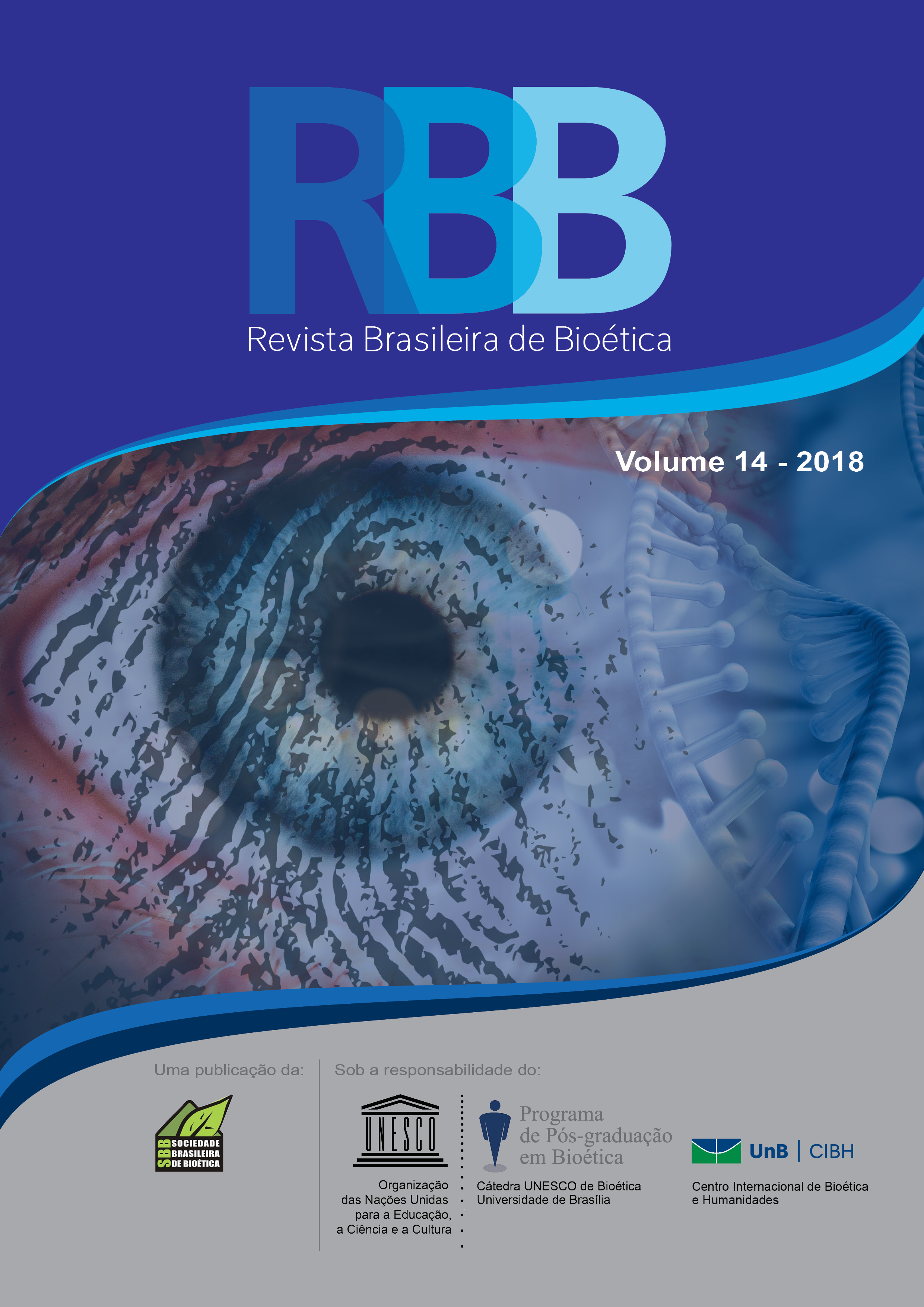Maximizing benefits and minimizing harm in health: a contribution to the debate
DOI:
https://doi.org/10.26512/rbb.v14i0.20622Keywords:
Bioethics. UNESCO. benefit. harm. health care. research with human beings.Abstract
Throughout the civilizing process, not causing harm and expanding benefits are common aspirations for different human societies. The present article discusses the “Principle of Benefit and Harm” in the light of the Universal Declaration on Bioethics and Human Rights of UNESCO (DUBDH). Considering the concerns related to health practices, especially those associated with patient safety, the study develops a critical analysis of some concepts related to this principle. After a brief introduction on different approaches taking into account benefit and harm, it divides the approach into two main parts, both of which are covered in Article 4 of DUBDH: its implications for clinical research and its relationship to essential care for people’s health and associated technologies. It is worth emphasizing the conceptual uncertainty, as well as the difficulty in the harmonization between harm and benefits. It is also possible to hypothesize that the moral reasons that challenge the damage overlap those that question the clear absence of benefits.
Downloads
References
Aarons D. Ethical issues surrounding body integrity and research. West Indian Medical Journal 2014;63(5):399-400.
Aarons DE. Exploring the risk/benefit balance in biomedical research: some considerations. Revista Bioética 2017; 25(2):320-327.
Angell M. A verdade sobre os laboratórios farmacêuticos: como somos enganados e o que podemos fazer a respeito. 5aed. Rio de Janeiro: Record, 2010.
Araújo LZS. Breve história da bioética: da ética em pesquisa a bioética. In: Rego S, Palácios M (org.). Comitês de Ética em Pesquisas: teoria e prática. Rio de Janeiro: Editora Fiocruz; 2012. p. 71-84.
Associação Médica Mundial. Declaração de Helsinque, 2013. Acessível em: http://www.wma.net>uploads>2016/11.
Brasil. Agência Nacional de Vigilá‚ncia Sanitária. Assistência Segura: Uma Reflexão Teórica Aplicada à Prática. 2aed. Brasília: Anvisa, 2017.
Brasil. Conselho Nacional de Saúde. Resolução n° 466, de 12/12/2012. Institui as diretrizes e normas regulamentadoras de pesquisas envolvendo seres humanos. Brasília: Diário Oficial da União,13/06/2013.
Beauchamp TL, Childress JF. Principles of biomedical ethics. 7th.ed. New York: Oxford University press; 2013.
Bosco E, Ferreira L. Sociedade mundial de risco: teoria, críticas e desafios. Sociologias 2016; 18 (42): 232-264.
Campbell SM, Roland MO, Buetow SA. Defining quality of care. Social Science and Medicine 2000; 51(11):1611”“1625.
Conselho Regional de Medicina do Estado do Paraná. Texto da Declaração Universal foi aprovado após dois anos de debates, 2006. Acessível em:
Costa, EA. Vigilá‚ncia sanitária: temas para debate [online]. Salvador: EDUFBA, 2009. 237 p.
Cruz MR, Oliveira SLT, Portillo JAC. A declaração universal sobre bioética e direitos humanos ”“ contribuições ao Estado brasileiro. Revista Bioética 2010; 18 (1): 93-107.
Evans D. Academic freedom and global health. Journal of Medical Ethics 2012; 38:98-101.
Evans D. Equitable health care. In: Evans D. Values in Medicine: what are we really doing to patients? London/New York: Routledge, 2008.
Evans D. Benefit and Harm. In: Have HTen, Gordijn B (eds). Handbook of global bioethics. London/New York: Springer, 2014, p. 59-73.
Francis L. Benefit and Harm. In: Have HTen (ed). Encyclopedia of Global Bioethics. New York/London: Springer; 2016, p. 240-246.
Garrafa V, Prado MM. Alterações na declaração de Helsínque: a história continua. Revista Bioética 2007; 15 (1): 11-25.
Garrafa V, Solbakk, JH, Vidal S, Lorenzo C. Between the needy and the greedy: The quest for a just and fair ethics of clinical research. Journal of Medical Ethics 2010; 36:500”“504.
Garrafa V. Solidarity and Cooperation. In: Have H Ten, Gordijn B (eds). Handbook of global bioethics. London/New York: Springer, 2014, p. 169-186.
Garrafa V. Declaración de Helsinki y sus repetidos “ajustes” un tema fatigoso. Revista Lasallista Investigación 2014; 2(1): 21-26.
Harman E. Can we harm and benefit in creating? Phylosophical Perspectives 2004; 18:89-113.
Have HT, Gordijn B. Global Bioethics. In: Have H Ten, Gordijn B (eds). Handbook of global bioethics. London/New York: Springer; 2014, p. 3-18.
Hood C, Rothstein H, Baldwin R. The government of risk: understanding risk re- gulation regimes. New York: Oxford University Press, 2004.
Kottow M. Bioética de riesgos biomédicos. Revista Bioética 2010; 18(1):15-30.
Kottow M. História da ética em pesquisa com seres humanos. Revista EletroÌ‚nica de Comunicação, Informação & Inovação em Saúde 2008; 2:1-18.
Kottow M. Vulnerabilidad, susceptibilidades y bioética. Lexix Nesis-Jurisprudência 2003; (4):23-9.
Michaelis: dicionário prático da língua portuguesa. São Paulo: Editora Melhoramentos, 2010. 952 p.
Paranhos FRL, Garrafa V, Melo RL. Estudo crítico do princípio de benefício e dano. Revista Bioética 2015; 23 (1): 12-9.
Potter VR. Bioethics: bridge to the future. New Jersey, 1971.
Schafer A. Biomedical conflicts of interest: a defence of the sequestration thesis, learning from the cases of Nancy Olivieri and david Healy. Journal of Medical Ethics 2004; 30:8-24.
Schramm R.F. Bioética sem universalidade? Justificação de uma bioética latinoamericana e caribenha de proteção. In: Garrafa, V.; Kottow, M.; Saada, A. (Orgs.). Bases conceituais da Bioética: enfoque latino-americano. São Paulo: Gaia, 2006. p.143-57.
Travassos C, Caldas B. A qualidade do cuidado e a segurança do paciente: histórico e conceitos. In: BRASIL. Agência Nacional de Vigilá‚ncia Sanitária. Assistência Segura: Uma reflexão teórica aplicada à prática. 1aed. Brasília (DF): Anvisa, 2017. (19-27).
UNESCO. Declaração Universal sobre Bioética e Direitos Humanos. Tradução brasileira da Cátedra UNESCO de Bioética da Universidade de Brasília e Sociedade Brasileira de Bioética. Paris, 2005. Acessível em: www.bioetica.catedraunesco.unb.br
Wendler D, Miller FG. Assessing research risks systematically: the net risks test. Journal of Medical Ethics 2007;33(8):481-86.
World Health Organization: world alliance for patient safety, taxonomy: the conceptual framework for the international classification for patient safety - final technical report. Genebra; 2009.



